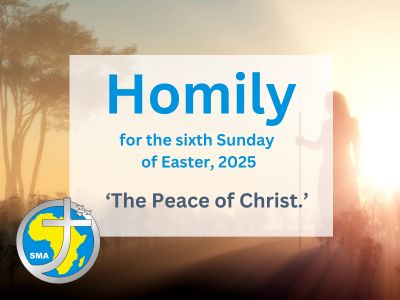Readings: Acts 15:1-2,22-29; Apocalypse 21:10-14; John 14:23-29
Theme: The Peace of Christ
By Michael Mcabe
Towards the end of the 19th century, the Irish poet William Butler Yeats was living in London, at that time a bustling, noisy, metropolis undergoing rapid change in the wake of the industrial revolution. He felt homesick and lost, unable to connect with what he called his ‘deep heart’s core’. He longed to return to his homeland and live alone in a place of tranquillity and beauty – a longing he expressed in these lines from The Lake Isle of Innisfree:
I will arise and go now, and go to Innisfree,
And a small cabin build there, of clay and wattles made….
And I shall have some peace there, for peace comes dropping slow,
Dropping from the veils of the morning to where the cricket sings.
For Yeats peace was synonymous with escape from the hustle and bustle of city life and retreat to a remote island where he could live in communion with nature.
Immediately following his election as Supreme Pontiff, Pope Leo XIV’s first words were ‘Peace be with you all’. Peace is a key element in the message of Jesus. His constant concern was to free people from fear and anxiety and bring them true and lasting peace. His words, ‘Fear not…Do not worry…Be not afraid’ (Mk 6:50); ‘Go in peace’ (Lk 7:50), run through the gospel like a refrain. In today’s gospel reading, taken from his final conversation with his disciples, Jesus says: ‘Peace I leave you; my own peace I give you. A peace the world cannot give, this is my gift to you. So do not let your hearts be troubled or afraid” (Jn 14:27).
Just as peace was Jesus final gift to his disciples before his death, it was also his first gift to them after his resurrection, and before sending them on mission: ‘Peace be with you. As the Father has sent me so I am sending you’ (Jn 20:21). The peace Jesus offers his disciples is not the peace that Yeats longed for – an escape from the trials, difficulties and responsibilities of life. It is rather ‘a peace the world cannot give’, a gift of the Spirit. It is a peace that empowers us to be agents of God’s reign of justice and love, a peace that enables us to endure all kinds of trials and tribulations. Finally, it is an enduring peace that no one can take away from us.
Our first reading today, taken from the Acts of the Apostles, shows that the peace Christ bequeathed to his disciples did not render them immune from disagreement and conflict. It describes the first major controversy in the early Church and tells us how it was resolved. The issue in question concerned the Jewish rite of circumcision. This was a requirement of the Mosaic law for all male Jews and a sign of their identity as ‘God’s covenanted People’. The first Christian converts were circumcised Jews. They did not see themselves as founders of a new religion but as members of a movement within Judaism, a movement centred on Jesus Christ as the true Messiah.
As the Jesus movement spread outside Jerusalem, it attracted increasingly large numbers of Gentiles. The question arose as to whether or not these new converts should also be circumcised. This issue was hotly debated with some Jewish converts, who had been members of the Pharisee party, insisting on circumcision, contrary to the view expressed by Paul and Barnabas: ‘Unless you have yourselves circumcised in the tradition of Moses you cannot be saved’ (Acts 15:1). The issue was finally resolved at a meeting of Paul, Barnabas, and some from Antioch with the Apostles and elders of the Church in Jerusalem. The meeting was known as the Council of Jerusalem and took place around the year 50 AD. The Council decided unanimously that Gentile converts to Christianity should not be obliged to be circumcised or to observe the rites of the Mosaic law, with the exception of some particularly sensitive practices for Jewish members of the Christian community.
Given the fact that the leaders of the Christian Community in Jerusalem were themselves circumcised Jews, this was a remarkable decision, resolving a conflict that could have split the early Church. As Luke’s account makes clear, this decision was the fruit of a discernment, guided by the Holy Spirit. ‘It has been decided by the Holy Spirit and by ourselves’ (Acts 15:29). It was a decision that not only ensured the unity and peace of the early Christian Community but paved the way for the spread of Christianity to the ends of the earth. Hopefully current conflicts within the Church will be similarly resolved through discernment and openness to the Spirit under the leadership of Pope Leo XIV.
I conclude with poem about the peace of Christ by Malcolm Guite,
Not as the world gives, not the victor’s peace,
Not to be fought for, hard-won, or achieved,
Just grace and mercy, gratefully received:
An undeserved and unforeseen release,
As the cold chains of memory and wrath
Fall from our hearts before we are aware,
Their rusty locks all picked by patient prayer,
Till closed doors open, and we see a path
Descending from a source we cannot see;
A path that must be taken, hand in hand,
Only by those, forgiving and forgiven,
Who see their saviour in their enemy.
So reach for me. We’ll cross our broken land,
And make each other bridges back to Heaven.
Alternative audio Homily by Tom Casey:

